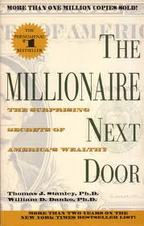 At the recommendation of several people, I read The Millionaire Next Door, a book debunking a lot of myths around who millionaires are and how they live their lives. I found the book interesting, and a lot of the data the authors gathered definitely surprised me (they surveyed over 11,000 millionaires). I thought, however, the the book was too focused on data and statistics; listening to the audio version made it painfully clear how many numbers and statistics were in the text. I also was disappointed that the authors didn't spend much (if any) time in their text going into the question of the purpose of wealth accumulation. A lot of focus was on how people accumulate wealth and how not to get carried away consuming, but there was little or no discussion of the happiness that results from consumption and how short-term happiness can or should be traded off against long-term financial security and wealth accumulation. I understand this is something very personal that everyone decides, but it would've been nice for the authors to talk about how such a decision can be made. Finally, it would be nice if the book were updated for any changes that might have happened in recent years in buying habits, incomes, etc. Below are some of my main takeaways/notes on the book.
Research Findings
3 Comments
Scott Simmons
4/3/2011 07:53:58 am
Max, what does "pick a niche, supply the applicant" mean? Are they saying that picking a niche is a means of becoming affluent, and these are good niches to choose?
Reply
Max
4/3/2011 07:57:16 am
Hey, Scott! Great to hear from you.
Reply
g
4/3/2011 09:42:28 am
whoa, i'm way behind on net worth
Reply
Your comment will be posted after it is approved.
Leave a Reply. |
Archives
June 2024
Categories
All
Subscribe |
 RSS Feed
RSS Feed
